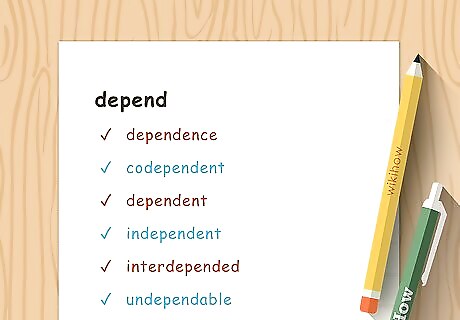
views
Expanding Your Vocabulary

Read books written in English. Books and magazines can introduce you to new words, provided you pay attention to the words and look up the ones you don't know rather than skipping over them. Read out loud daily so you can practice sentence structure and pronunciation. Keep a dictionary nearby when you're reading, and look up any word you don't know. Read the whole definition for the word, and think about how the author is using it in context. Make a running list of words you encounter as you read. You can go back and study them later.

Write down and practice new words. You won't internalize all the words you pick up from your reading if you don't practice them regularly. Flashcards can be useful for drilling new words, provided you use them correctly. If you write words on flashcards, include a sentence using the word. Having context will help you better remember it. Rotate your flashcards regularly so that you don't get bored drilling the same words. Don't just learn the word in isolation – learn different forms of the word as well. For example, if you've learned the word depend, take note of related words such as dependence and independence. Find out what prepositions are normally used with the word as well. Incorporate words you like into your working vocabulary. For example, you could play a game with yourself where you choose a word and make an effort to use that word at least 3 times during the day.

Do crossword puzzles. Crossword puzzles give you an opportunity to learn new words, as well as recall words you've learned and think about different contexts and meanings of words you already know. You can buy relatively inexpensive crossword puzzle books at grocery and convenience stores. There are also crossword puzzle apps available for smart phones, many of which are free.

Use a thesaurus. If you find yourself using the same words often, look them up in a thesaurus and find synonyms that you can use instead. Search for these words online so you can get a feel for how to use them in context. For example, if you always use the word pretty, you can expand your vocabulary by adding words such as beautiful and lovely in your writing. Watch out for clogging your writing with too many fancy words, though. It will make your writing more difficult to read, and some people may consider it pretentious.

Play word games, such as Scrabble and Boggle. Games are a fun way to expand your vocabulary, and add a little competitive pressure if you're playing with friends. You can invest in physical board games if you want, or download one of many mobile apps. Word games with a speed element will improve your recall of words, while also helping you discover new words. If you make a word during a game and you don't know its meaning, remember to look it up in the dictionary and add it to your vocabulary drills.
Improving Grammar and Punctuation

Read your writing out loud. Reading aloud can make grammar and punctuation errors obvious, even if you might not have noticed them otherwise. As you read, pay attention to where you pause and make sure your punctuation reflects those pauses. Read sentences in backwards order if you want to focus on each sentence individually. Then read the whole piece from beginning to end, looking at how the sentences flow together. If you stumble over something as you read, go back and edit that part of your writing until you can read it smoothly.

Use professional writers as models. Journalists and published authors have spent considerable time and effort honing their writing skills. Collect work by writers you enjoy reading and try to emulate them in your own writing. Read actively, thinking about why the author wrote a sentence the way they did. Consider the effect of their punctuation usage. Look up the rules for any language conventions you notice that you're not familiar with. Take out a piece of paper and a pen and copy a passage verbatim. It can help you get used to writing using correct grammar and punctuation.

Study grammar and word usage. There are many websites that have free grammar and word usage lessons, tips, and exercises. You can use these to learn new skills and practice incorporating them into your writing. Purdue University hosts the Purdue Online Writing Lab (OWL), which offers more than 200 free resources to help improve your written English. Visit https://owl.english.purdue.edu/ to explore. You can also find free exercises, tutorials, and ebooks at https://www.grammar.com/.

Reduce your dependency on autocorrect. While grammar and spelling checks are useful, they're not infallible. They may miss glaring mistakes while simultaneously correcting something that wasn't wrong to begin with. Grammar and spell checks also typically don't teach you why a correction was made. They can't improve your grammar or spelling because you don't know the rules used. To reduce your dependency on these tools, turn them off while you're typing – you can turn them back on once you've finished writing and read through your work at least once. Another way to reduce your dependency on grammar and spell check is to handwrite your first draft, and then type it into the computer if you need a digital copy of your work.
Developing Good Writing Habits

Use a conversational writing style. The most readable writing is written the way people talk. Keep your sentence structure simple, and use mostly common, ordinary words that most people know. Contractions will make your writing more readable and less stuffy. Most people use contractions conversationally, and they're appropriate for all but the most formal writing. Writing in active voice (subject-verb-object) will give you the simplest sentence structure. But you do want to vary the length of your sentences to avoid monotony.

Outline longer or more complex pieces. If you're writing something longer than a paragraph, or if you need to make several different points, an outline will help you organize your thoughts. It will also make your writing flow more easily because you won't be worried about forgetting something. Even if your writing itself still has room for improvement, your piece will read better overall if your thoughts are well organized and clearly communicated. Look over your outline before you start writing, and put yourself in your reader's shoes. Think about anything you haven't explained. Include enough context that you can get your message across.

Proofread and edit everything you write. Everyone makes mistakes. Read over everything you write, even something as short as a text message. Over time, you'll notice an improvement in your first drafts. If you proofread regularly, you'll likely see that you repeat some of the same errors. Make a note of the areas that give you difficulty so you can go back and do additional study and drills. Reading backward is a good way to catch punctuation and grammatical errors in longer pieces.

Put pen to paper instead of typing on a computer. Since writing is slower than typing, you'll put more thought into your work. Additionally, when you handwrite you don't have any grammar or spelling checks to rely on. Writing by hand also gives you the opportunity to work on improving your handwriting skills, so that you can write neatly and legibly.

Practice writing every day. As with anything else, you'll improve your writing by practicing more. Even if you can't devote a lot of time, setting aside just 5 or 10 minutes a day to write will help you get better at it. For example, you might purchase a small journal and set aside a few minutes to write before bed. You can write about something that happened during the day, something you learned, or an activity or event you're looking forward to later on in the week. While you don't necessarily need to share this daily writing practice with anyone, you may want to publish your journal online in blog form so you can get feedback on your writing progress.



















Comments
0 comment